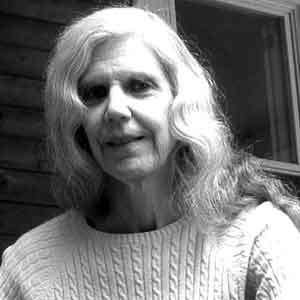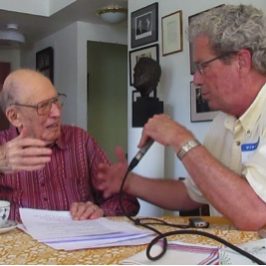

Celebrating this milestone with an excerpt from Dorothy Pula Strohecker (Issue 1) and poems by Sharron Singleton and Nan Fry (Issue 50).
6 minutes
TRANSCRIPT
This is Burning Bright’s 150th episode. To commemorate it, pieces from Passager Issues One and 50.
From Passager’s first issue back in 1990, excerpts from Dorothy Pula Strohecker’s essay “The Alliad.”
The alley had a presence of its own. In the early morning, a sole churchgoer might wind his or her way on a shortcut to six o’clock Mass. Later in the morning, the four Fabiszak kids went single-filing up the alley dressed in their uniforms, heading for Our Lady of Sorrows parish school . . .
The ghosts of our forebears idled there. These were no mythical ancestors. They bore ahead of us the same burdens as we, winding their way up and down the alley. Even the gates that opened or closed on the alley, stood at night like lost sentries or phantoms, muter to all that passed. But the alley had a presence of its own and was like a cat that saw all in the dark . . .
East Baltimore is full of alleys that record in various ways the pock marks of civilization. Sometimes they even function as byproducts of civilization, like miniature dumps where you don’t even have to excavate to find the discards of the current culture: the ever-present beer bottles, the occasional used condom, or the tattered windswept pages of old newspapers . . .
In the alley we were not only aesthetically sociable, but patriotically, politically, logically and morbidly social. We ran not only to call others to come and see the sunset or the spectacle or a rainbow, but the “I Am An American Day Parade,” the latest speech rallying toward the park, the grocery store explanation of the way a radio works, and the latest blood accident around the corner in which two cars mangled each other and a couple of bodies to boot . . .
Though this alley was not the boundary of all reality, it was most definitely the cosmological boundary of our enclosed world, a kind of Jordan forming the frontier between the outer world of sensationalism and our inner world of sacramentalism. The alley was like a vaulting bridge between earth and sky, and we, the real-life billy goats or salt-of-the-earth mortals, went trip-trapping on that bridge in a sometimes topsy-turvy world hoping to reach the hereafter.
From Passager’s first issue back in 1990, excerpts from “The Alliad” by Dorothy Pula Strohecker.
Jumping 20 years to Passager Issue 50, here’s a poem by 2010 Passager Poet Sharron Singleton, “Liturgies of the Body.”
I peer at the sonogram
and see you
afloat in your firmament.
You drift
and dive, toes and fingers
glisten, flex
like small sea worms.
In late-afternoon light
I sit, think of the
liturgies
of the body, how just
days ago
your great-grandmother
came unmanacled
from her body,
that strong will
umbilical to this life,
unraveling —
while you, quick fish
will soon
ride the red waters,
be cut loose
from your slick line
as earth
hauls you out,
reels you in.
“Liturgies of the Body,” Sharron Singleton. Sharron said that back when she was in college, she showed some of her poems to her professor, and he said, “I think you should just get married and have a family.” She didn’t write another poem for 33 years. Passager is a tribute to those writers who started writing later in life and those who stopped writing at some point and then returned to it.
Also from Passager Issue 50, Nan Fry’s poem “Riddle.”
With four legs and one foot,
I cannot move, yet I carry you off.
The clothes I wear keep you warm. Though I’m not a boat,
I float you on a tide of change. When you ride upon me,
the familiar grows strange.
“Riddle,” Nan Fry. Nan said, “I enjoy riddle poems because they refresh our perception of the world by presenting something ordinary and familiar in a way that is mysterious. And what is more mundane and mysterious than the platform that launches us into our dreams?
Now that you know that the riddle is about a bed, let’s listen to it one more time . . .
With four legs and one foot,
I cannot move, yet I carry you off.
The clothes I wear keep you warm. Though I’m not a boat,
I float you on a tide of change. When you ride upon me,
the familiar grows strange.
Nan describes a bed as “the platform that launches us into our dreams . . .” I think that’s a good description of Passager, don’t you?
We’ve been celebrating Burning Bright’s 150th podcast with pieces from Passager Issues One and 50. To subscribe to or learn more about Passager and its commitment to writers over 50, go to passagerbooks.com. You can download Burning Bright from Spotify, Apple and Google Podcasts and various other podcast apps. For Kendra, Mary, Christine, Rosanne, and the rest of the Passager staff, I’m Jon Shorr.
Due to the limitations of online publishing, poems may not appear in their original formatting.






